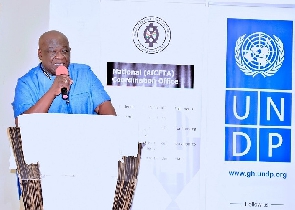The National AfCFTA Coordination Office (NCO) in collaboration with the UNDP has organized an intensive sensitization on the African Continental Free Trade Area (AfCFTA) for Micro, Small and Medium Enterprises (MSMEs) in Kumasi as part of their Market Expansion Project aimed at encouraging businesses to harness the full benefit of the African Continental Free Trade Area (AfCFTA). According to the Coordinator of the National AfCFTA Coordination Office (NCO), Dr. Fareed Arthur, the project aims to support local companies with export potential to take advantage of the AfCFTA. “As part of NCO’s 2022 Annual Workplan to boost the participation of Micro, Small and Medium-sized Enterprises (MSMEs) in AfCFTA, 180 enterprises are being targeted to assess their export readiness. Out of which at least fifty (50) companies would be identified and supported to export under the AfCFTA regime”. To achieve this, the head of Ghana’s National Coordination AfCTA Office said the NCO will undertake nationwide enterprise export-readiness assessments/audits on selected companies and SMEs to identify their needs and ascertain what it would take for them to access the AfCFTA market. “The results of these assessments/audits will determine the technical, financial, and/or capacity-building assistance/interventions that would be provided to the targeted companies to export under AfCFTA”. Micro, Small and Medium Enterprises (MSMEs) form the backbone of Ghana’s economy, representing more than 90% of private businesses, and employing about 72% of women and youth in the private informal sector and 68% in the private formal sector. The importance of the MSME sector is even more magnified, employing more than 80% of the workforce and generating 70% of the national output. There are multiple, often inter-connected complex barriers to starting and conducting trading on the continent. These barriers tend to be significantly higher for women and youth-led MSMEs. These barriers include issues of limited access to resources (land, finance, etc), and limited access to market information on trade, customs, and border regulations. The African Continental Free Trade Area provides an important opportunity for women and youth-led MSMEs in Ghana. The agreement's objectives are to create a single, continent-wide market and enhance competitiveness at the enterprise level. According to the World Bank, Ghana’s intra-African trade is projected to double under the AfCFTA by 2035, anchored on revenues from value-added manufacturing, with women and youth benefiting the most. According to the UNDP, more than 70% of cross-border traders are women and youth and most of whom were significantly and negatively impacted by COVID-19 pandemic which was revealed by a COVID-19 Business Tracker survey they conducted with the Ghana Statistical Service and World Bank to ascertain the impact of the pandemic on their operations. Sylvia Senu, a UNDP Economic Analyst says as a result of this, they are committed to supporting government recovery effort for MSMEs through an integrated and inclusive MSMEs support programme which will strengthen capacity for good corporate governance and awareness creation to prevent radicalization, Business development services support and Energy and resource efficiency capacity. “We are working with the Ghana National AfCFTA Coordination Office to build the capacity of the MSMEs and also helping them with mentoring and coaching them to access catalytic funding," says UNDP’s Economic Analyst, Sylvia. Ghana’s National AfCFTA Coordination Office (NCO) under the Ministry of Trade and Industry hopes its collaboration with the UNDP will help prepare Ghanaian MSMEs tap into the AfCFTA which makes available a market of 1.3 billion people.

















